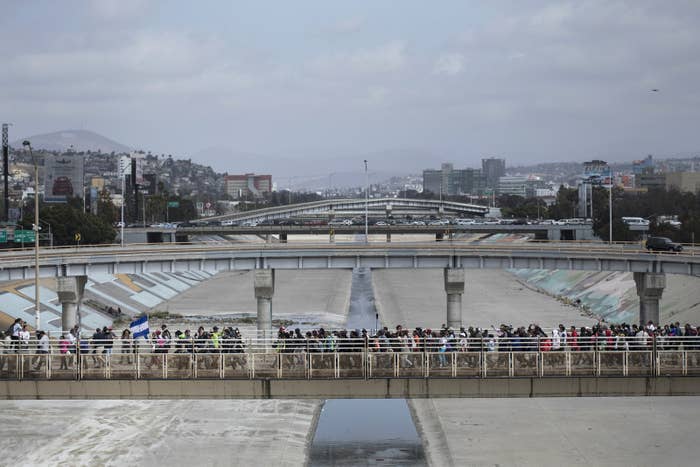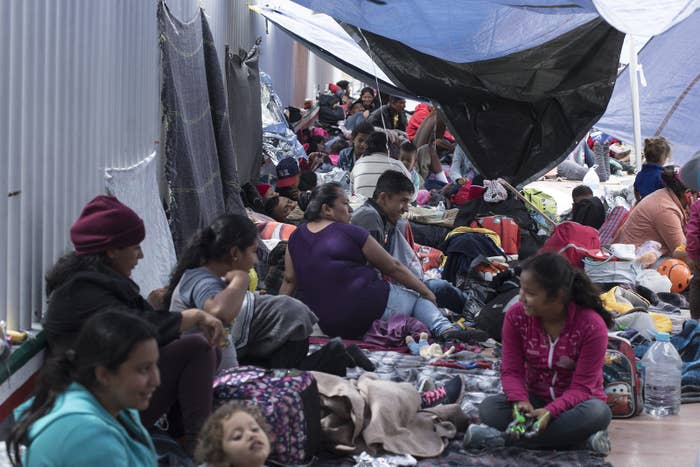
More than 90% of the Central Americans who applied for asylum after arriving at the US border in last spring's caravan passed the first step of the application process and were allowed into the country, according to figures from US Citizenship and Immigration Services, the government agency that processes such claims.
Of the 401 people the government considered to be part of the caravan, 374, or 93%, passed what's known as a credible fear interview, where immigration officers determine whether an asylum applicant has a well-founded fear that they will be tortured or persecuted in their home country because of their race, religion, nationality, membership in a particular social group, or political opinion.
If they pass the interview with an asylum officer, their case goes before an immigration judge.
The high success rate of asylum-seekers in the spring caravan, which arrived at the border in May after a month-long trek across Mexico, may explain why the Trump administration now is considering ways to prevent new arrivals from applying for asylum at the border — something that is allowed under US immigration law. The overall success rate for asylum-seekers' credible fear interview was 76% in 2018.
Under a proposal that is still being debated inside the Trump administration, the president would issue a proclamation barring residents of certain countries from entering the United States as security risks. The Department of Homeland Security and the Department of Justice would then cite that proclamation to bar the asylum applicants.
The move would be a sweeping change by the Trump administration to longstanding immigration practice and would undoubtedly draw a legal challenge. But advocates of the proposal believe a Supreme Court decision that allowed the Trump travel ban to go into effect earlier this year paved the way for such a step.
Word of the high success rate for asylum-seekers from last spring's caravan comes as a new caravan of Central Americans is making its way through Mexico toward the United States. Trump has denounced the new caravan, which at one time numbered more than 7,000 people, as including criminals, but nearly two-thirds of the members appear to be women and children. The majority of those in the new caravan are from Honduras and Guatemala. Mexican officials said Friday the group now numbers about 3,600 people.
Allegra Love, an immigration attorney who helped screen potential asylum-seekers in the Mexican city of Puebla during the last caravan, said the reason the positive credible fear figure was so high was because the people who asked for refuge were fleeing very real violence and death threats back home.
"All of these threats and deterrents aren't working because there is an actual credible refugee crisis," Love told BuzzFeed News. "Short of closing the border to migrants and refugees, there's not a lot you can do."
Love is concerned the Trump administration will close ports of entry to people with lawful asylum claims.
Love, who received credible death threats and FBI protection after Fox News reported that she was coaching people on how to get across the border, said she did the opposite. When she screened potential asylum-seekers in Mexico, she told the ones who didn't have good claims not to even attempt it because of how tough the administration had made it for asylum-seekers.
"There are children on this caravan. I think we have to always remember we're going to be closing doors to a child, not that adults don't deserve the same compassion," Love said. "We're creating an international crisis."

At a press conference Friday in Calexico, California, where about two miles of a 30-foot tall border fence was unveiled, Department of Homeland Security Secretary Kirstjen Nielsen said the threshold for credible fear interviews is too low.
"We have about 80 to 90% that pass," Nielsen told reporters. "At the end of the process, only 20% are determined by a judge to meet the United States statutory requirements for asylum."
Asylum applicants who don't have a viable claim but are able to pass a credible fear interview overwhelm the immigration court system and prevent the US from "helping those who need asylum quickly," Nielsen said. The immigration court backlog is at an all time high of 764,561, according to the Transactional Records Access Clearinghouse (TRAC) at Syracuse University.
It will be weeks before the most recent caravan arrives at the US border, and it is unlikely that the number of people who make it all the way to the border will remain that large.
During the spring caravan, about 327 people or 22% of the caravan, which at its peak numbered 1,500, arrived at the US–Mexico border as a group to ask for asylum in May. The government's numbers, 401 claims for asylum, include anyone the government believes was in the caravan and was screened from April 11 to June 6.
Initially, US border authorities said they didn't have the capacity to allow the people in the caravan to ask for asylum. After a standoff between the US and the caravan members who camped outside the San Ysidro port of entry, they were allowed to request refuge in groups over several days.
That pattern will likely be repeated with the current caravan, with some migrants choosing to remain in Mexico while others will arrive at the US border separately from the main group.
Another factor likely to affect asylum claims is changes in the standards by which an asylum claim is judged. In June, Attorney General Jeff Sessions issued a ruling that removed fear of domestic and gang violence as reasons for granting asylum.
